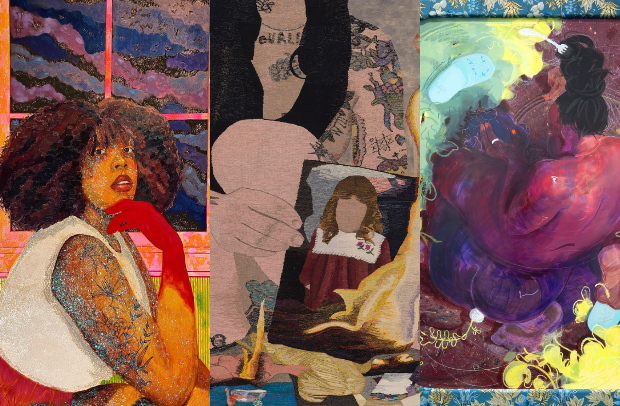(re)Focus Festival Convenes Tyler Alumni Panel to Discuss Portraying Women's Bodies

In March, amid a Philadelphia-wide celebration of women artists, three Tyler alums will reflect on the portrayal of female bodies in art in a panel discussion hosted by Tyler and Temple Contemporary.
The panel, (im)positions - Women Portraying Women’s Bodies, will feature a conversation among visual artists Erin M. Riley (MFA ’09), Autumn Wallace (BFA ’18), and Chelsey Luster (BFA ’19), moderated by art historian and Tyler Professor Emerita Therese “Terry” Dolan, PhD.
The event is part of the (re)FOCUS festival (January 27—May 31, 2024), which celebrates the 50th anniversary of the pioneering 1974 festival, Philadelphia Focuses on Women in the Visual Arts. FOCUS was one of the first large-scale surveys of contemporary American women artists.
With over 150 exhibitions, panels, lectures, workshops, and demonstrations, (re)FOCUS, organized by Tyler alum Judith K. Brodsky (MFA '67) and Diane Burko with the assistance of Marsha Moss, aims to show how the movement for inclusivity and diversity in the art world has materialized today.
While much has changed after five decades of cultural shifts and social movements in the United States, the importance of platforming and centering historically underrepresented voices in the art world is still readily apparent in 2024. Women-identified and BIPOC artists continue to challenge societal norms and ignite cultural change, exploring and confronting themes of gender identity, representation, equality, social justice, and empowerment in their work.
The depiction of female bodies in art, as rendered by women artists, is a topic that continues to have profound significance and relevance in today's culture. Ahead of the Tyler-Temple Contemporary event, the panelists shared their reflections on how the portrayal of women’s bodies (both their own, and those of others) manifests in their respective works – and why this is central to their artistic practices and identities.
Luster, a Philadelphia-based curator, educator, and visual artist from Baltimore, MD, explores the complexities of safe spaces in queer and Black culture through mixed medium paintings and installations. She began her practice as a portrait artist by creating self-portraits to navigate concepts of safe spaces, womanhood, Blackness, and queerness. This led to a wider investigation of representation, safety, and agency through creating portraits of others in her community.
“My portraits began as a direct response to the lack of protection for Black femmes in my community and myself due to the intersections of our identities, and turned into a reinterpretation of safe spaces,” Luster said.
Luster creates introspective portraits with installations and mixed-media paintings that give Black, queer, trans, and femme individuals a space to share what makes them feel safe. Her process for creating these paintings includes sharing a meal in a safe space selected by her models, interviewing subjects about their memories and comforts, photoshoots, and collaborating on the artwork’s installation. This method has shaped Luster’s practice into what she calls a “care-centered, community-focused experience.”
“These works showcase Black, queer, trans, and femme people in a way that highlights their tenderness and vulnerability to challenge the hyper-sexualized and performative narratives often placed on these communities in mainstream media, and gives my models agency over their image,” she explained.
Wallace, a visual artist based in Philadelphia, works across media to create paintings and sculptures that examine human sexuality, gender, and the Black femme experience. Like Luster, her reflections emphasize the potential for empowerment, encouragement, and communal care in such artistic depictions.
“The importance of portraying the femme physique in all its glory is more important than ever. With videos able to edit so-called ‘imperfections’ in real time, we forget how beautiful our true skin is; the stories written throughout its rolling hills and troughs of growth,” Wallace shared. “Emphasizing the stories our skin tells empowers the next generation, not only in physical self-esteem but helps them avoid the thickets of physical dissatisfaction when so much more is out there for us to achieve.”
Riley, a Brooklyn-based artist whose work focuses on women and women's issues primarily in hand-woven hand dyed wool tapestries, views self-portraiture as a means of navigating and processing life experiences – as well as confronting and subverting conventionally held cultural narratives around women’s self-expression as it relates to notions of safety and autonomy.
“The self-portrait has appeared within my tapestries in many different forms as an exploration and assertion of my existence, my softness, my resiliency and my relational experiences,” Riley said. “Using various objects, imagery I have taken of myself, and memories I work to express narratives and unlearn the fear, shame, and insecurities that go along with existing in the body of a woman.”
“Self-exposure is often blamed for so much of the violence that is experienced within life, but I have made it my mission to work toward a future in which one can have trauma and still have hope for a day in which our body is not used as a weapon against us,” she continued. “I use my body within my work to assert my humanity and confront complexities within the assumptions and stories viewers can tell themselves about a person who does so.”
Riley, Luster, and Wallace will delve further into these topics with Dolan during the (re)Focus festival panel, (im)positions - Women Portraying Women’s Bodies. The event will take place on March 15, 2024, with a reception at Temple Contemporary, Tyler School of Art and Architecture's center for exhibitions and public programming, at 6 p.m., followed by the panel discussion at 6:30 p.m. in the first-floor auditorium of the Science Education and Research Center (SERC).